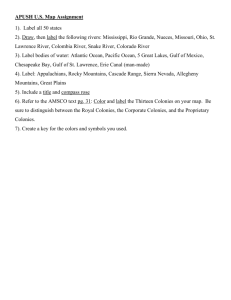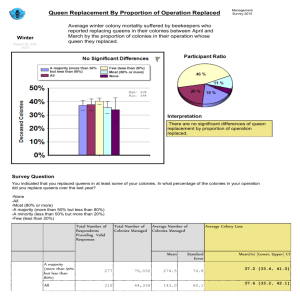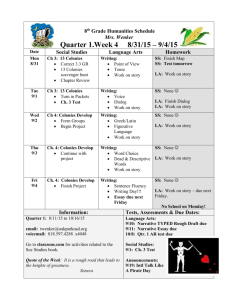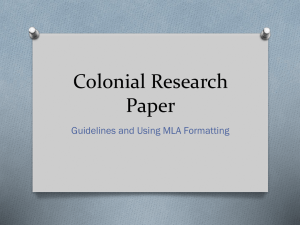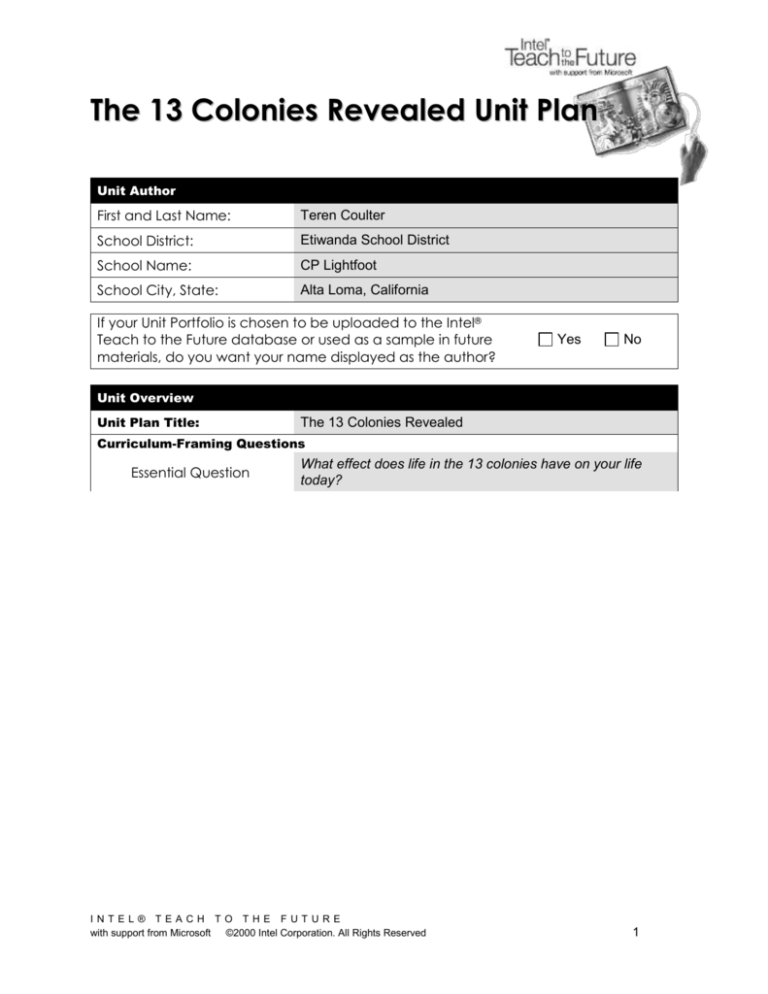
The 13 Colonies Revealed Unit Plan
Unit Author
First and Last Name:
Teren Coulter
School District:
Etiwanda School District
School Name:
CP Lightfoot
School City, State:
Alta Loma, California
If your Unit Portfolio is chosen to be uploaded to the Intel®
Teach to the Future database or used as a sample in future
materials, do you want your name displayed as the author?
Yes
No
Unit Overview
Unit Plan Title:
The 13 Colonies Revealed
Curriculum-Framing Questions
Essential Question
What effect does life in the 13 colonies have on your life
today?
INTEL® TEACH TO THE FUTURE
with support from Microsoft ©2000 Intel Corporation. All Rights Reserved
1
Unit Questions
- Describe the founding of the New England, Middle, or
Southern Colonies.
1. Where are your colonies located?
2. Who founded your individual colonies and in what
year?
3. Why were your colonies founded?
- Describe the daily life in the New England, Middle, or
Southern Colonies.
1. What religion did the people in your colonies
follow? Describe the religious aspects of your
colonies.
2. Describe resources that your colonies benefited
from.
3. Describe the daily life of the colonists in your
colonies.
- Describe the ruling systems in the New England, Middle,
or Southern Colonies.
1. What did the government look like in your
colonies?
2. What were your colonies’ ideas about
government?
Unit Summary:
Students will be able to describe the makings and development of specific colonies in a
selected region (New England, Middle, Southern) through the use of powerpoint, publisher,
and an oral presentation.
Subject Area(s): Click box(es) of the subject(s) that your Unit targets
Business Education
Engineering
Home Economics
Language Arts
Music
School to Career
Social Studies
Drama
Foreign Language
Industrial Technology
Math
Physical Education
Science
Technology
Other:
Other:
Other:
Grade Level: Click box(es) of the grade level(s) that your Unit targets
K-2
6-8
ESL
Gifted and Talented
3-5
9-12
Resource
Other:
INTEL® TEACH TO THE FUTURE
with support from Microsoft ©2000 Intel Corporation. All Rights Reserved
2
Targeted State Frameworks/Content Standards/Benchmarks:
History and Social-Science
5.4 Students understand the political, religious, social, and economic institutions that evolved in the
colonial era.
1.
Understand the influence of location and physical setting on the founding of the original 13 colonies, and
identify on a map the locations of the colonies and of the American Indian nations already inhabiting
these areas.
2.
Identify the major individuals and groups responsible for the founding of the various colonies and the
reasons for their founding (e.g., John Smith, Virginia; Roger Williams, Rhode Island; William Penn,
Pennsylvania; Lord Baltimore, Maryland; William Bradford, Plymouth; John Winthrop, Massachusetts).
3.
Describe the religious aspects of the earliest colonies (e.g., Puritanism in Massachusetts, Anglicanism in
Virginia, Catholicism in Maryland, Quakerism in Pennsylvania).
4.
Describe the introduction of slavery into America, the responses of slave families to their condition, the
ongoing struggle between proponents and opponents of slavery, and the gradual institutionalization of
slavery in the South.
5.
Explain the early democratic ideas and practices that emerged during the colonial period, including the
significance of representative assemblies and town meetings.
Research and Technology
1.3 Use organizational features of printed text (e.g., citations, end notes, bibliographic references) to
locate relevant information.
1.4 Create simple documents by using electronic media and employing organizational features (e.g.,
passwords, entry and pull-down menus, word searches, the thesaurus, spell checks).
Writing Applications (Genres and Their Characteristics)
2.4 Write persuasive letters or compositions:
a. State a clear position in support of a proposal.
b. Support a position with relevant evidence.
c. Follow a simple organizational pattern.
d. Address reader concerns.
Listening and Speaking
1.0 Listening and Speaking Strategies
Students deliver focused, coherent presentations that convey ideas clearly and relate to the background and
interests of the audience. They evaluate the content of oral communication.
2.0 Speaking Applications (Genres and Their Characteristics)
Students deliver well-organized formal presentations employing traditional rhetorical strategies (e.g., narration,
exposition, persuasion, description). Student speaking demonstrates a command of standard American English
and the organizational and delivery strategies outlined in Listening and Speaking Standard 1.0.
INTEL® TEACH TO THE FUTURE
with support from Microsoft ©2000 Intel Corporation. All Rights Reserved
3
Student Objectives/Learning Outcomes:
1. Students will describe the founding of the colonies (states that make up their region,
date each colony was founded, the year each colony was founded, and why colony
each was founded).
2. Students will describe the religion, government, economy, and daily life in their
colonies.
3. Students will create a powerpoint presentation with template already created for them.
4. Students will write a persuasive essay that meets all writing standards that persuades
others to come to their colony.
5. Students will present powerpoint presentation to the class.
Procedures:
1) Students will research about their assigned colonies (New England, Middle, or Southern)
in groups of 4. They are given an outline of what to research based on the Unit Questions.
Students may use computer, encyclopedias, text books, etc.
2) Students will open basic powerpoint presentation already created for them. The basic
powerpoint already has titles and bullets inserted with basic instructions (insert name of your
colonies, insert the states included in your colony, etc.) Students may then edit the titles and
bullets so they are geared toward their specific colonies (New England, Middle, or Southern).
Students may then insert their own graphics, either imported from the internet or a clip art
source. If students accomplish these steps, they may play with text and slide transitions.
3) Students will present their Powerpoint presentation to the class.
4) Individually, students will create a brochure persuading others to travel to their colonies.
They will need to meet the state standards dealing with persuasive writing. (Writing
Applications 2.4)
Approximate Time Needed:
-
3 days for research (1 hour time slot)
3 days for powerpoint presentation (1/2 hour time slot)
3 days for brochure (1 hour time slot)
1 day for presentation prep (1 hour time slot)
1 day for presentations
Prerequisite Skills:
- Students should have a basic sense of how to use word processing.
- Students should have a sense of how to research and gain information for completing a
research report.
- Students should know the fundamentals for writing a persuasive essay.
Materials and Resources Required For Unit
Technology – Hardware: (Click boxes of all equipment needed)
INTEL® TEACH TO THE FUTURE
with support from Microsoft ©2000 Intel Corporation. All Rights Reserved
4
Camera
Computer(s)
Digital Camera
DVD Player
Internet Connection
Laser Disk
Printer
Projection System
Scanner
Television
Technology – Software: (Click boxes of all software needed.)
Database/Spreadsheet
Image Processing
Desktop Publishing
Internet Web Browser
E-mail Software
Multimedia
Encyclopedia on CD-ROM
VCR
Video Camera
Video Conferencing Equip.
Other:
Web Page Development
Word Processing
Other:
Printed Materials:
- 5th grade Social Studies Text
- encyclopedias
- Additional reading material on colonies
Supplies:
- Videos based around colonial life
- Access to a computer
California State Standards
http://www.cde.ca.gov/be/st/ss/index.asp
Standards that support Colonial Unit
Internet Resources:
Colonial Period
http://www.nd.edu/~rbarger/www7/pur1.jpg
Classroom Clip Art
http://classroomclipart.com/
Others:
- 5th grade field trip to Riley’s Farm
Accommodations for Differentiated Instruction
Resource Student:
- Student will have a longer length of time to complete
project.
- Number of slides will be reduced and modified. Student
will be required to make a minimum of four slides.
- Resource Specialist will assist with project.
Non-Native English
Speaker:
- Student will have longer length to complete project.
- More assistance with completing project and translating
information.
- Student will work with other students to assist.
Gifted Student:
- Powerpoint: Students may experiment with and
implement text and slide transitions.
- Publisher: Student may import graphics from internet and
may experiment with and implement text.
Page 5 of 6
Student Assessment:
Key Word Search:
- Student will be graded based on the created rubrics for
unit.
- colony, colonies, colonists
- New England, Middle, and Southern
- religious persecution
- religious toleration
- plantation
- town meetings
- meeting house
- slavery
Page 6 of 6



